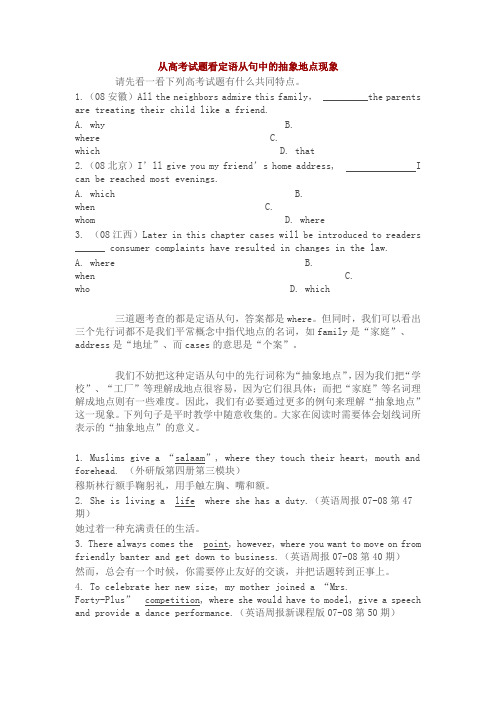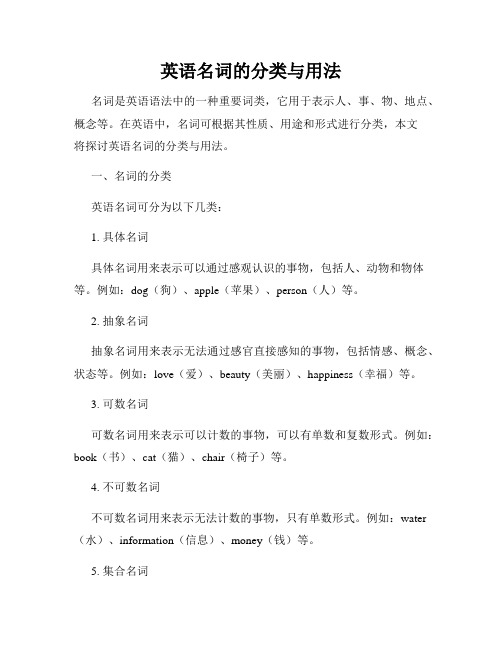抽象名词表地点
英语中的名词是什么意思

英语中的名词是什么意思在英语语言中,名词是一类非常重要的词性,它是用来指称人、事物、地点、概念等的词语。
名词在句子中起着承担主语或宾语等重要角色的作用,是构建语法结构的基础之一。
名词的分类名词在英语中有多种分类方式,根据其性质、结构和用途可以分为以下几类:1.普通名词:用来指代一般的人、事物或概念,如:dog(狗)、book(书)、love(爱)等。
2.专有名词:用来指代特定的人、地点或组织等,如:Tom(汤姆)、London(伦敦)、Google(谷歌)等。
3.抽象名词:用来指代抽象概念和感情等,如:freedom(自由)、happiness(幸福)、truth(真理)等。
4.集体名词:用来表示一群人或事物的总称,如:family(家庭)、team(团队)、herd(兽群)等。
5.数词:表示数量或顺序的词,如:one(一)、first(第一)等,通常作为名词的修饰语或后置。
6.复合名词:由两个或多个词组合而成的名词,如:firefly(萤火虫)、toothbrush(牙刷)等。
7.可数名词和不可数名词:可数名词表示可以分开计数的实体,如:apple(苹果);不可数名词表示无法分开计数的实体,如:water(水)。
名词的作用名词在句子中可以担当多种不同的语法成分,通常包括以下几种主要作用:1.主语:名词作为句子的主语,起到引出主要动作或状态的作用,如:Birds sing.(鸟儿歌唱。
)2.宾语:名词作为句子的宾语,接受动作的作用,如:She reads a book.(她读一本书。
)3.表语:名词作为表语,说明主语的状态或特征,如:He is a teacher.(他是一名老师。
)4.定语:名词作为定语,修饰其他名词,如:a blackcat(一只黑猫)。
5.补语:名词作为补语,用来补充说明主语或宾语,如:She became a doctor.(她成为了一名医生。
)名词的使用在英语中,名词的使用具有一定的规范性,包括以下几点要求:1.单复数形式:名词通常有单数和复数两种形式,根据情境或逻辑关系选择适当的形式。
高考中涉及的抽象地点名词

从高考试题看定语从句中的抽象地点现象请先看一看下列高考试题有什么共同特点。
1.(08安徽)All the neighbors admire this family, _________the parents are treating their child like a friend.A. whyB.where C.which D. that2.(08北京)I’ll give you my friend’s home address, I can be reached most evenings.A. whichB.when C.whom D. where3. (08江西)Later in this chapter cases will be introduced to readers ______ consumer complaints have resulted in changes in the law.A. whereB.when C.who D. which三道题考查的都是定语从句,答案都是where。
但同时,我们可以看出三个先行词都不是我们平常概念中指代地点的名词,如family是“家庭”、address是“地址”、而cases的意思是“个案”。
我们不妨把这种定语从句中的先行词称为“抽象地点”,因为我们把“学校”、“工厂”等理解成地点很容易,因为它们很具体;而把“家庭”等名词理解成地点则有一些难度。
因此,我们有必要通过更多的例句来理解“抽象地点”这一现象。
下列句子是平时教学中随意收集的。
大家在阅读时需要体会划线词所表示的“抽象地点”的意义。
1. Muslims give a “salaam”, where they touch their heart, mouth and forehead. (外研版第四册第三模块)穆斯林行额手鞠躬礼,用手触左胸、嘴和额。
2. She is living a life where she has a duty.(英语周报07-08第47期)她过着一种充满责任的生活。
英语名词的分类与用法

英语名词的分类与用法名词是英语语法中的一种重要词类,它用于表示人、事、物、地点、概念等。
在英语中,名词可根据其性质、用途和形式进行分类,本文将探讨英语名词的分类与用法。
一、名词的分类英语名词可分为以下几类:1. 具体名词具体名词用来表示可以通过感观认识的事物,包括人、动物和物体等。
例如:dog(狗)、apple(苹果)、person(人)等。
2. 抽象名词抽象名词用来表示无法通过感官直接感知的事物,包括情感、概念、状态等。
例如:love(爱)、beauty(美丽)、happiness(幸福)等。
3. 可数名词可数名词用来表示可以计数的事物,可以有单数和复数形式。
例如:book(书)、cat(猫)、chair(椅子)等。
4. 不可数名词不可数名词用来表示无法计数的事物,只有单数形式。
例如:water (水)、information(信息)、money(钱)等。
5. 集合名词集合名词用来表示由多个部分组成的整体,例如:family(家庭)、team(团队)、group(小组)等。
6. 特指名词特指名词用来表示特定的人或事物。
例如:the Sun(太阳)、the White House(白宫)等。
二、名词的用法除了根据分类,名词还可以根据其在句子中的作用来使用。
1. 主语名词可以作为句子的主语,用来说明动作的执行者或句子的主要内容。
例如:Jane is a teacher.(简是一名教师。
)2. 宾语名词可以作为句子的宾语,说明接受动作的对象。
例如:He loves music.(他喜爱音乐。
)3. 表语名词可以作为句子的表语,用来说明主语的身份、特征或状态。
例如:She is a doctor.(她是一名医生。
)4. 定语名词可以作为句子的定语,修饰其他名词或代词。
例如:a blue car (一辆蓝色的车)。
5. 同位语名词可以作为句子的同位语,与另一个名词并列,起到进一步解释、补充说明的作用。
例如:My teacher, Mr. Smith, is very kind.(我的老师,史密斯先生,非常友好。
抽象名词的定语从句剖析

特点:
修饰的名词不是具体的地点名词,而 是一个抽象名词,即分别是activity,
case, point,state,stage, situation ,
friendship 等 意指“情况、情形、形 势、优势”时,引导词常用 where 或
介词+ which 。
一、where定语从句修饰抽象名词point You reach a point where medicine can’t help. 你已到了药物无法治疗的地步。 The crisis has reached a point where the receiver will have to be called in. 危机已达到非把破产管理人叫来不可的地步。 We have reached a point where a change is needed. 我们到了必须改一改的地步。 注:有时point也可以是具体的地点: Let the point where AB cuts CD be called E. 设AB线与CD线的相交点为E。 The accident happened at the point where the A15 joins the M1. 事故发生在A15与M1交叉的十字路口。
take the job.
这使我陷入一种不能接受此工作的境地。
六、where定语从句修饰抽象名词job She wants a job where her management skills
can be put to good use.
她想找一份能将她的管理技能派上用场的工作。
I don’t want a job where I’m chained to a 工作。
①当先行词为case,condition,situation,position,
定语从句抽象地点的用法

例句: There is one point that we must insist on.
We're just trying to reach a point where both sides will sit down together and talk.
练习:
1. After graduation she reached a point in her career she needed to decide what to do. [2007 江西卷] A.that B.what C.which D.where 2. He has a good job _____ he enjoys himself well. A. that B. what C. which D. where
• 3. Today, we’ll discuss a number of cases_____ beginners of English fail to use the language properly. • [2007 陕西卷] A. which B. as C. why D. where
4. Those successful deaf dancers think that dancing is an activity ________ sight matters more than hearing. [2007 天津卷] A. when B. whose C. which D. where
补充资料:抽象地点状语从句

补充资料:抽象地点名词作先行词常见的抽象地点名词有:point, case, activity, situation, position, occasion, job, race, letter, platform, letter, email, policy,environment,等等。
(不强调死记硬背,重点理解从句中缺状语。
)一、看例句,加深理解。
You reach a point where medicine can’t help. 你已到了药物无法治疗的地步。
We have reached a point where a change is needed.我们到了必须改一改的地步。
There are cases where the word “mighty” is used as an adverb. 在一些情况下,mighty一词可用作副词。
Those successful deaf dancers think that dancing is an activity where sight matters more than hearing. 那些失聪的成功舞蹈演员们认为,舞蹈是一种让人看胜过让人听的活动。
He got into a situation where it is hard to decide what is right and wrong. 他陷入一种难以分辨是非的局面。
occasion后面用when还是where?如果occasion表示“机会”, “时间”的话就用when引导。
eg. Occasions are quite rare when I have the time to spend a day with my kids.如果它翻译成“场合”,表示地点, 就用where引导。
eg. This is not an occasion for laughter, where you must take things seriously.二、练习。
名词的十个基本类型
名词的十个基本类型
1. 人物名词:指代具体的人或人类个体,如“学生”、“父母”等。
2. 地点名词:指代具体的地点或地理位置,如“城市”、“学校”等。
3. 物体名词:指代具体的物体或事物,如“书”、“汽车”等。
4. 抽象名词:指代无法触摸或直接感知的概念、状态或品质,如“爱”、“希望”等。
5. 时间名词:指代具体的时间点、时间段或时间单位,如“年”、“星期”等。
6. 事件名词:指代具体的事件、活动或行为,如“观看电影”、“做饭”等。
7. 群体名词:指代一组人或物的集合,如“家人”、“学生们”等。
8. 抽象集合名词:指代某一类事物的集合,如“动物”、“植物”等。
9. 数量名词:指代数量和数目,如“个”、“匹”等。
10. 过程名词:指代某一连续动作或变化的过程,如“生长”、“变化”等。
抽象名词表地点
where 引导的定语从句归纳——由一道考试题想开去单项选择题如下:Yesterday my aunt sent me an email_____ she told me she would come to see me next week.A. whichB. whereC. thatD. when本题正确答案为B, 但是大部分学生都选了C。
本题中an email为先行词,题意为:昨天我姑姑给我发了一封电子邮件,在邮件中她告诉说下周要来看我。
从句中缺少状语,应该用关系副词where ,相当于in which。
1. —Where did you get to know her?—It was on the farm we worked. (山东卷)A. thatB. thereC. whichD. where2. Some pre-school children go to a day-care center, they learn simple games and songs. (全国I)A. thenB. thereC. whileD. where3. Those successful deaf dancers think that dancing is an activity —sight matters more than hearing. (天津卷)A. whenB. whoseC. whichD. where4. Today, we’ll disc uss a number of cases ___D___ beginners of English fail to use the language properly. (陕西卷)A. whichB. asC. whyD. where5. After graduation she reached a point in her career ___D___ she had to decide what to do. (江西卷)A. thatB. whatC. whichD. where以上5道题的答案分别是DDDDD,其中前面两道比较容易,因为它们符合“where引导的定语从句用于修饰表示地点的名词”这一基本用法。
名词的基本概念
名词的基本概念名词是语言中最基本的词类之一,用来表示人、事物、地点、概念、状态等。
在语法中,名词通常用来作为主语、宾语、表语、定语和补语等。
本文将介绍名词的基本概念,并探讨其种类和在句子中的不同用法。
一、名词的定义名词是指可以用来表示具体或抽象事物的词语。
它是构建语言中重要的基石,帮助我们描述和交流周围的世界。
名词可以指称人、动物、事物、地点、抽象概念、状态等。
二、名词的种类名词可以根据其具体的特点和用法分为以下几种类型:1. 专有名词专有名词指特定的人、地点、机构等具体的名称,如人名、地名、国家名、公司名等。
专有名词通常以大写字母开头。
例如:- 人名:张三、玛丽- 地名:伦敦、巴黎- 国家名:中国、美国- 公司名:苹果、谷歌2. 普通名词普通名词是指用来表示一般概念的词语,不特指某个具体的人或事物。
普通名词可以分为可数名词和不可数名词。
- 可数名词:表示可以数清个体的名词,可以用单数或复数形式出现。
例如:书、桌子、苹果- 不可数名词:表示无法具体数清或不可分割的名词,只能用单数形式。
例如:水、爱、时间3. 抽象名词抽象名词是用来表示抽象概念、状态、感受等的名词。
抽象名词通常是不可触摸、看不见的事物。
例如:- 爱、希望、勇气(抽象概念)- 幸福、快乐、孤独(抽象状态)- 愤怒、惊喜、悲伤(抽象感受)4. 集体名词集体名词是用来表示一类集体、整体或群体的名词。
它们被视为一个整体,通常用单数形式。
例如:- 家庭、团队、政府5. 化合名词化合名词是由两个或更多名词组合而成的复合词。
化合名词可以用来表示复杂的事物或概念。
例如:- 电话、汽车、草地三、名词的用法名词在句子中可以担当不同的语法角色,具体包括:1. 主语名词可以作为句子的主语,用来说明句子主要谈论的是谁或什么。
例如:- 猫是一种宠物。
- 音乐给人们带来快乐。
2. 宾语名词可以作为动词的宾语,接受动作的影响。
例如:- 我喜欢阅读。
- 他去了足球场。
名词知识点小学阶段总结
名词知识点小学阶段总结名词的分类名词主要分为以下几类:人名、物品名、地点名、抽象名词。
在学习名词的过程中,学生需要学会辨别不同类型的名词,并且在使用时要根据不同的名词类型做出相应的语法处理。
1. 人名:表示人的名称,如张三、李四等。
人名属于专有名词,它们通常以大写字母开头。
2. 物品名:表示事物的名称,如书、桌子等。
物品名可以分为可数名词和不可数名词。
3. 地点名:表示地点的名称,如北京、上海等。
地点名属于专有名词,它们通常以大写字母开头。
4. 抽象名词:表示抽象概念的名称,如美丽、勇敢等。
抽象名词是指不能通过五官感知到的概念,它们通常是不可数名词。
名词的功能名词在句子中可以担任多种不同的语法功能,包括主语、宾语、定语、表语等。
学生需要逐步了解名词在句子中的不同功能,并能够正确使用名词来构成完整的句子。
1. 主语:名词作为句子的主语,用来说明动作的施事者或者是主要讲话的对象。
如:The cat is sleeping.(猫正在睡觉。
)2. 宾语:名词作为句子的宾语,接受动作的对象或行为。
如:I like apples.(我喜欢苹果。
)3. 定语:名词作为句子的定语,用来修饰其他名词或代词。
如:The red car is mine.(那辆红色的车是我的。
)4. 表语:名词作为句子的表语,用来说明主语的身份、特征等。
如:She is a teacher.(她是一名老师。
)名词的数量名词的数量包括单数和复数两种形式。
学生在学习名词的数量时,需要了解名词的单复数变化规则,以及掌握一些特殊的名词复数形式。
1. 单数名词:表示一个人,一件事物或者一个抽象概念的名称。
如:cat, book, pencil等。
2. 复数名词:表示多个人,多件事物或者多个抽象概念的名称。
名词的一般复数形式是在词尾加上-s或-es。
如:cats, books, pencils等。
3. 特殊名词复数形式:有些名词的复数形式并不遵循一般的变化规则,需要学生们通过记忆来掌握。
- 1、下载文档前请自行甄别文档内容的完整性,平台不提供额外的编辑、内容补充、找答案等附加服务。
- 2、"仅部分预览"的文档,不可在线预览部分如存在完整性等问题,可反馈申请退款(可完整预览的文档不适用该条件!)。
- 3、如文档侵犯您的权益,请联系客服反馈,我们会尽快为您处理(人工客服工作时间:9:00-18:30)。
where 引导的定语从句归纳——由一道考试题想开去高三英语组省英语专家赵庆玲2013年12月25日的日照市高三校际联考试卷中有一道单项选择题如下:Yesterday my aunt sent me an email_____ she told me she would come to see me next week.A. whichB. whereC. thatD. when本题正确答案为B, 但是大部分学生都选了C。
本题中an email为先行词,题意为:昨天我姑姑给我发了一封电子邮件,在邮件中她告诉说下周要来看我。
从句中缺少状语,应该用关系副词where ,相当于in which。
1. —Where did you get to know her?—It was on the farm ___D___ we worked. (山东卷)A. thatB. thereC. whichD. where2. Some pre-school children go to a day-care center, ___D___ they learn simple games and songs. (全国I)A. thenB. thereC. whileD. where3. Those successful deaf dancers think that dancing is an activity ___D___ sight matters more than hearing. (天津卷)A. whenB. whoseC. whichD. where4. Today, we’ll discuss a number of cases ___D___ beginners ofEnglish fail to use the language properly. (陕西卷)A. whichB. asC. whyD. where5. After graduation she reached a point in her career ___D___ she had to decide what to do. (江西卷)A. thatB. whatC. whichD. where以上5道题的答案分别是DDDDD,其中前面两道比较容易,因为它们符合“where引导的定语从句用于修饰表示地点的名词”这一基本用法。
但是,后面3道题则有所不同,因为它们修饰的名词不是具体的地点名词,而是一个抽象名词,即分别是activity, case, point。
由于一般的语法书对这一问题很少涉及,所以许多考生对这类考题比较生疏。
1.一、where定语从句修饰抽象名词pointYou reach a point where medicine can’t help. 你已到了药物无法治疗的地步。
The crisis has reached a point where the receiver will have to be called in. 危机已达到非把破产管理人叫来不可的地步。
We have reached a point where a change is needed. 我们到了必须改一改的地步。
二、where定语从句修饰抽象名词caseThere are cases where the word “mighty” is used as an adverb. 在一些情况下,mighty一词可用作副词。
Today, we’ll discuss a number of cases where beginners of Englishfail to use the language properly. 今天,我们将讨论一些英语初学者对英语使用不当的问题。
三、where定语从句修饰抽象名词activityThose successful deaf dancers think that dancing is an activity where sight matters more than hearing. 那些失聪的成功舞蹈演员们认为,舞蹈是一种让人看胜过让人听的活动。
四、where定语从句修饰抽象名词situationHe got into a situation where it is hard to decide what is right and wrong. 他陷入一种难以分辨是非的局面。
If you risk something important, you cause it to be in a dangerous situation where you might lose it. 你如果拿重要的东西去冒险,那你就是将它置于一种可能会失去它的危险境地。
五、where定语从句修饰抽象名词positionIt’s put me in a position where I can’t afford to take the job. 这使我陷入一种不能接受此工作的境地。
六、where定语从句修饰抽象名词jobShe wants a job where her management skills can be put to good use. 她想找一份能将她的管理技能派上用场的工作。
I don’t want a job where I’m chained to a desk all day. 我不想找一份整天坐在办公桌前的工作。
高考真题练练看1.He wrote a letter_______ he explained what had happened in theaccident.A. whatB. whichC. whereD. how2.Nowadays people are more concerned about the environment _____ they live.A. whatB. whichC. whenD. where3.Life is like a long race_______________________ we compete with others to go beyond ourselves.A.whyB. whatC. that A. where4.——What do you think of teaching, Bob?—— I find it fun and challenging. It is a job_____ you are doing something serious but interesting.A.whereB. whichC. whenD. that5.It’s helpful to put children in a situation _______ they can see themselves differently.A. thatB. whenC. whichD. where归纳:常见的引导词有:point, case, activity, situation, position, job, race, letter, platform, letter, email, training center,environment等等。
同位语从句的考题对比:The secret was finally let out______ she was an abandoned child.A.whichB. thatC. whatD. as本题为同位语从句,she was an abandoned child用来解释the secret 的具体内容。
高考真题链接:1.When the news came_______ the war broke out, he decided to serve in the army.A.sinceB. whichC. thatD. because2.——Is there any possibility _________ you could pick me up at the airport?——No problem.A.whenB. thatC. whetherD. what3.The fact has worried many scientists____ the earth is becoming warmer and warmer these years.A. whatB. whichC. thatD. though4.There is clear evidence__________ the most difficult feeling of all to interpret is bodily pain.A. whatB. ifC. howD. that5.The notice came around two in the afternoon______ the meeting would be postponed.A.whenB. thatC. whetherD. how该类同位语从句的引导词有:fact, news, word, possibility, evidence, notice, secret等等。
本次试题书面表达参考答案:Hello, everyone! We’re going to organize a bicycle trip to our school farm this Sunday. It lies in the western suburb of the city, covering anarea of about 50 acres. Different kinds of cattle and various vegetables are raised and planted there,without using any harmful things in the feed or the fertilizer. The products are provided to the school canteen, where the teachers and the students enjoy a healthy diet. On the farm the students can combine what they have learned with practice.You’ll start your trip at 7:30AM, and when you get there, you’ll be shown around the farm before you have free lunch served there, and after lunch, you may return to our school. Take care when you cross the streets, and make sure never do any damage to the plants during the visit.Wish you a pleasant trip! Thank you.部分学生习作展示,由你来改错。
